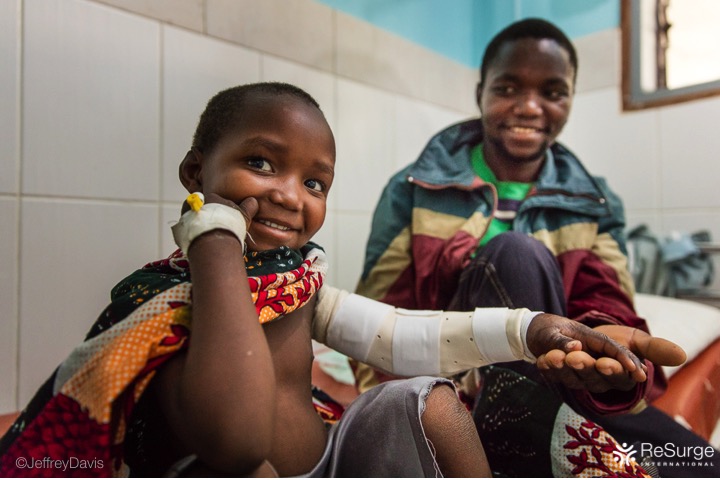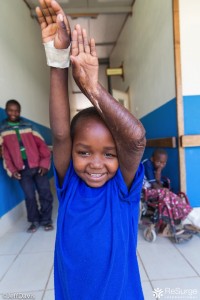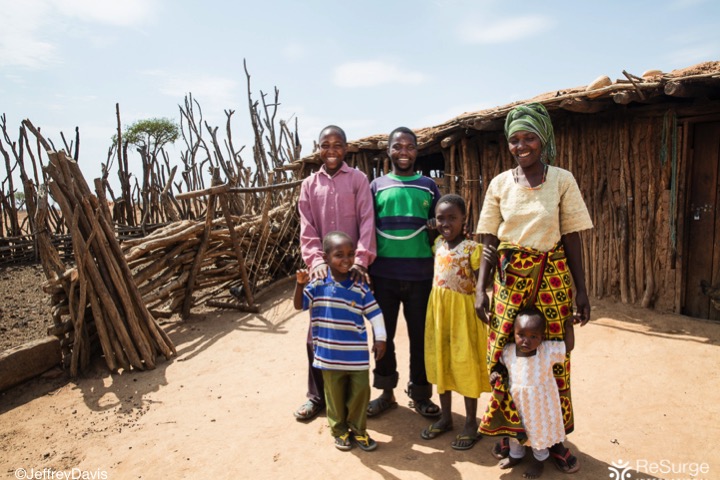ALL Health Workers Count: From the Rural Clinic to the Surgical Suite Together, They Saved Jonas’ Life

By Sara Anderson, ReSurge International

Jonas is one brave little 5 year old. He lives with his family under a giant baobob tree on the plains of Tanzania. He loves to run and play and watch the bee hives high in branches near his home.
Two years ago, when he was just a toddler, there was a tragic accident. As in many homes in the developing world, Jonas’ mother boils water over an open flame. Drawn to the swirling bubbles, a curious Jonas reached deep into the roiling pot and was severely burned.
Only for the good fortune of a nearby truck and a month in a clinic, staffed with a few primary health care workers, was Jonas’ life saved.. Those frontline health workers thankfully were trained in the basics of trauma care and helped Jonas survive.

But in the following year, his scar tissue began contracting - his skin, tightening, fusing together leaving Jonas an increasingly painful, potentially useless limb. His father Augustine foresaw a life of dependency and pain.
When he heard about ReSurge International and their ability to repair disabling burns with reconstructive surgical care, he chose to act. He sold some of the family’s few possessions, and spent days on foot and buses, to get Jonas to the small hospital where ReSurge was working.
Jonas soldiered through and the surgery was a success – Jonas got his arm back. After a few days in the hospital, he was already heading home. Now Jonas can run, play, and watch the bees with a much brighter future ahead. His arm should gain full mobility and may someday match the strength of his smile.
Unfortunately Jonas’ accident is all too common. All too often, there are no health workers available to help children survive – and even fewer surgical doctors available to help children like Jonas thrive by reducing their needless disabilities.
The potential for dramatically life-altering surgery is enormous. Currently, Tanzania, a country of 45 million people, has only three reconstructive plastic surgeons to help Jonas, and the thousands of other children who suffer severe burns, other injuries and congenital anomalies each year.
Tanzania is not alone in its limited access to care. Five billion people lack access to safe, affordable surgical care and anesthesia when needed. The poorest 1/3 of the population only receives 6% of all surgical procedures, and surgical conditions represent nearly a third of the global burden of disease. This leads to death and life-changing disabilities, both of which could be prevented with access to cost-effective care.

Major policy developments and new evidence from the Lancet Commission on Global Surgery over the past year has put surgical care on the global health agenda for the first time in history. The World Bank’s Disease Control Priorities states that “surgical procedures are among the most cost-effective of all health interventions in the developing world,” and World Health Assembly officially adopted a resolution determining that surgical care is a critical component of universal health coverage.
Surgical care is a critical cross-cutting, cost-effective public health intervention to enhance health, productivity and economic development – and is not only an essential component of universal health coverage and health systems strengthening, but also key to gender equality and reaching the Sustainable Development Goals.
This World Health Workers Week, let’s remember that all health workers count – from those in the rural and remote clinics to those in the surgical suite. Together, we can heal untold numbers of patients across the globe and give them the same bright future now held by one brave little five year old on the plains of Tanzania.
Sara Anderson is senior advisor for advocacy and innovation for ReSurge International, which builds surgical capacity and provides reconstructive care in developing countries. Also contributing to this article are producer Bob Whitehill and Jeffrey Davis, an independent professional photographer and producer who has captured ReSurge’s work in Bangladesh, Tanzania and Zambia.
All photos by Jeffrey Davis.
